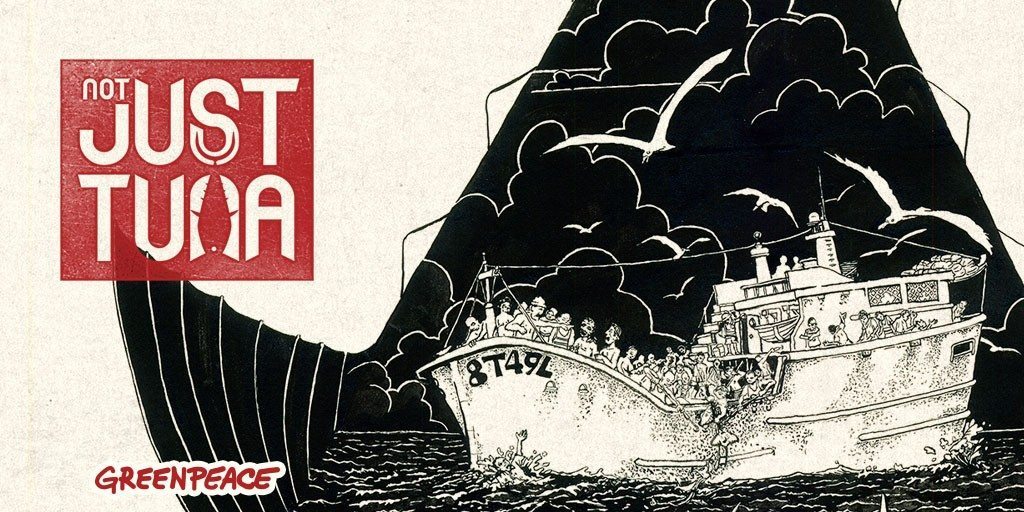Greenpeace has launched a global campaign targeting the world’s largest producer of canned tuna for its shady and destructive tuna sourcing. Human rights abuses in its seafood supply chains are among this company’s grave offenses.
With this tuna giant’s global reach extending into all of the world’s major tuna markets, it’s time for all tuna buyers to take a hard look at where their tuna is coming from.
Thai Union produces about one-fifth of the world’s tuna products. Most of its products are sold in supermarkets from San Francisco to Bangkok and most places in between. Every day, thousands of unsuspecting consumers reach for their trusted brands, but it’s not just tuna they are putting in their shopping cart. They’re putting a complex and often heart-breaking story of overfishing, hidden abuse, wasted marine life and poor social responsibility standards into a brightly labeled, shiny can and passing it off as a responsible option for family meals. Many of these trusted brands are either owned or supplied by Thai Union.
Thai Union owns major brands Petit Navire, John West, Chicken of the Sea, Century Tuna, Sealect and Mareblu. Bumble Bee/Clover Leaf may be added to this list if the company’s current acquisition attempt succeeds.
In addition to their parent company, these brands also share some other unfortunate similarities. They all sell tuna from fisheries that employ fishing methods — conventional longlines and purse seines using fish aggregating devices (FADs) — that catch more than just tuna (like sharks and sea turtles). They all lack rigorous social responsibility sourcing requirements. And they all have received failing grades in Greenpeace’s global canned tuna sustainability guides
But far more companies than its own brands are linked to Thai Union. Retailers are not only selling Thai Union-owned products, but many are being supplied for their house brands — including Walmart, LIDL, Big C and many others in Canada, Thailand, the United States, France, the UK and beyond. Food service providers like Sysco and restaurant chains like Olive Garden have also been linked to Thai Union.
In the absence of strong sustainable and ethical sourcing requirements, these companies cannot assure customers that their tuna isn’t coming from irresponsible fisheries and operations. And with Thai Union recently being tied up in scandal after scandal, now is the time for all canned tuna buyers to re-evaluate what they expect — and demand — from their suppliers and vendor partners.
Your company may think — our supply chains are free of Thai Union and clean, we do internal audits. But are you certain? The exploitation of people goes hand-in-hand with the exploitation of the oceans. Vessel operators who have little regard for labor laws often also have little regard for the environment or fisheries management regulations. Companies are increasingly motivated to employ cheap or forced labor and to fish illegally as fish populations dwindle from overfishing and demand for cheap seafood grows.
This is a big deal for the future of our oceans and the future of the seafood industry.
Depleted ocean resources put added pressure on coastal communities. Fisheries have to go on further and longer trips to meet the growing seafood demand, greed fuels overcapacity and illegal fishing, further depleting ocean resources, and vessels out at sea for extended periods of time can hide horrible conditions, making workers feel desperate and frustrated, leading to practices that also further exacerbate the overfishing problem. But this can change, and Thai Union Group, and your company, can drive it.
Greenpeace is calling on big buyers of tuna to clean up their canned tuna supply chains once and for all, to ask Thai Union to guarantee its products are not threatening the well-being of industry workers and our oceans, and to offer its customers only ocean-friendly and ethical tuna.




